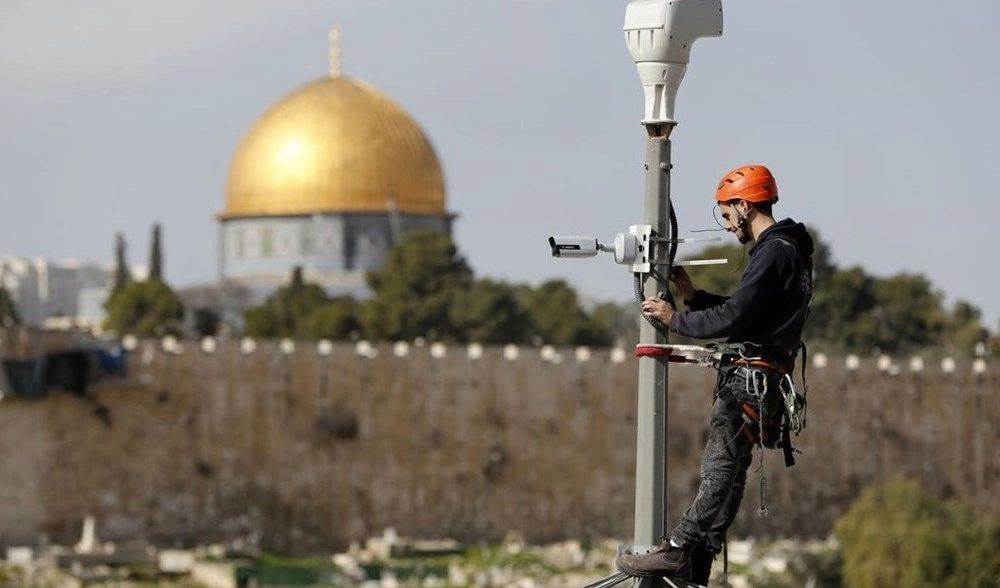"Tel Aviv's" booming AI sector comes from surveilling Palestinians
An analysis details how the occupation uses invasive surveillance on Palestinians before exporting it out of "Israel".
-

"Tel Aviv's" booming AI sector comes from surveilling Palestinians
In a Foreign Policy analysis, Sophia Goodfriend, a doctoral candidate in anthropology at Duke University, details the various ways the Israeli occupation enhances its invasive surveillance methods against Palestinians before exporting them abroad.
According to international law, privacy is a right. In Palestine, that is not the case.
In Al-Khalil, Wijdan Ziadeh's home was stormed in 2021 by Israeli occupation forces (IOF) to install CCTV cameras on her roof. "Israel's" Coordinator of Government Activities in the Territories calls Al-Khalil the “smart city".
The technology has transformed the city, as the cameras allow the occupation a glimpse into her private home and keep photos of visitors and family members, as well as store biographical information in the Blue Wolf database.
The surveillance program, put into action two years ago, involves in part a smartphone technology called Blue Wolf that captures photos of Palestinians' faces and matches them to a database of images so extensive that one former occupation soldier described it as the army's secret "Facebook for Palestinians."
The phone app flashes in different colors; yellow, red, and green to alert soldiers if a person is to be detained, arrested, or left alone, respectively.
To build Blue Wolf's database, soldiers competed last year in photographing Palestinians, including children and the elderly.
The total number of people photographed is unclear, but it is estimated to be in the thousands, and the unit that collects the most pictures receives prizes.
Unsafe in my own home
Ziadeh revealed that she feels "watched all the time, even inside my room. We don't feel safe inside our own homes."
In one part of Al-Khalil, settlers live in congested areas and the Blue Wolf system joins existing checkpoints, watchtowers, and army bases.
The "dystopian nightmare" for Palestinians includes a lack of fundamental privacy rights and frequent observation by Israeli soldiers. This permits corporations collaborating with the Israeli military to test and develop new technology on Palestinian residents in locations like Al-Khalil before exporting them elsewhere, with little oversight.
The high-tech methods make the occupation's presence what Goodfriend calls "frictionless".
In other words, Palestinians are surveilled from afar and imprisoned electronically, with no say whatsoever.
Some Palestinians have said soldiers stopped their children on the streets to photograph them without their permission.
Constantly watched
Another resident, Fatima Azzih, said the expanded surveillance has led to her and her family remaining indoors and secluded.
“No one wants to come here,” she said. “The kids don’t play outside. We’re constantly watched.”
According to Goodfriend, Israeli residents are protected by the Israeli military and encroach on Palestinian homes. Advanced monitoring technologies, according to commander Amit Cohen, who supervises "Israel's" civil administration in the area, aid in managing this hostile situation.
Cohen told "Israel" Hayom that "a network of sensors that knows how to monitor the space in real-time and identify what is unusual and what is not” making “all the information from the sensors … accessible to the soldiers.”
Issa Amro, a lifelong resident of Tel Rumeida, said the most dehumanizing part of the surveillance is the lack of control by Palestinians.
“We don’t know how soldiers are using this information, and we don’t know what they have access to or what they will use against me,” he said. “There is no influence we can have on the system. We don’t vote for who uses it. We can’t go to court to change some kind of regulation. It doesn’t take into consideration our culture, our need for privacy.”
He added that “part of the problem is it’s all done under the radar, so we don’t know what technology exists and what limits on the technology can exist.”
Just an experiment
Amro argues that "Israel's" denial of Palestinian's right to privacy is turning Al-Khalil into a testing site in global surveillance supply chains. "It's about using us [as] an experiment."
Many Israeli surveillance technologies are developed in occupied Palestine, where "Israel's" military control permits companies to prototype and perfect their goods before selling them elsewhere.
Goodfriend says that firms such as NSO Group are a glaring reminder of the threats that the existing quo poses to civic society throughout the world. NSO Group advanced in the private security business by aggressively recruiting veterans from elite Israeli intelligence units who could easily transfer surveillance know-how from the military to the commercial sector.
"Israel" does not limit its spying on Palestinians but has recently been found to spy on its own residents.
The Israeli occupation police force, following mounting accusations by rights groups of abusing powerful spyware, said "anomalies" had been found in its electronic surveillance, meaning the legality of its information collection was in question.
The officer alluded to the Israeli 1979 Secret Monitoring Law, which empowers eavesdropping on "suspected criminals or terrorists," though Pegasus provided the occupation with access to previous communications on hacked phones.
The reports added augmented pressure against "Israel", giving it a new layer: it went from international denunciations and condemnations after it was discovered that "Tel Aviv" exported Pegasus spyware, which was used to spy on human rights activists, journalists, and politicians, to internal ones.

 5 Min Read
5 Min Read








